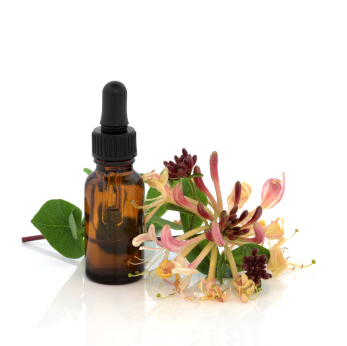Guide to Essential Oils
For the benefit of our visitors who are considering a spa treatment which calls for ingredients in a mask or wrap which are unfamiliar, “read below before you go.” This Guide to Essential Oils provides some basic information, but it’s also helpful for selecting a new or different combination of oils based on a profile that piques your interest.
Common Essential Oils in Skin Care and Body Care
Essential Oils are natural substances extracted from grasses, flowers, herbs, shrubs, trees, resins and spices, usually through a process called steam distillation or mechanical expression; oils produced with the aid of chemical solvents are not considered true Essential Oils.
Oils can soothe, relax, rejuvenate, heal, energize or relieve pain, thereby affecting the body’s physical, psychological and emotional levels. Essential Oils used in this manner is traditionally called aromatherapy.
Is “Aromatherapy” just a nice way to describe something that smells good?
 Aromatherapy is the therapeutic use of Essential Oils (also known as volatile oils) from plants (flowers, herbs, or trees) for the improvement of physical, emotional, and spiritual well-being.
Aromatherapy is the therapeutic use of Essential Oils (also known as volatile oils) from plants (flowers, herbs, or trees) for the improvement of physical, emotional, and spiritual well-being.
The effects of aromatherapy are theorized to result from the effect of odorant molecules from Essential Oils on the brain’s emotional center, the limbic system. Topical application of aromatic oils may exert antibacterial, anti-inflammatory, and analgesic effects. Studies in animals show sedative and stimulant effects of specific Essential Oils as well as positive effects on behavior and the immune system. Functional imaging studies in humans support the influence of odors on the limbic system and its emotional pathways.
In a randomized controlled trial investigated the effects of massage or aromatherapy massage in 103 cancer patients who were randomly assigned to receive massage using a carrier oil (massage group) or massage using a carrier oil plus the Roman chamomile Essential Oil (Chamaemelum nobile [L.] All. [synonym: Anthemis nobilis L.]) (aromatherapy massage group). Two weeks after the massage, the authors found a statistically significant reduction in anxiety in the aromatherapy massage group and an improvement in symptoms; the subscales with improved scores were psychological, quality of life, severe physical, and severe psychological.†
If you plan to recreate a spa treatment at home, or plan to follow one of “Spa at Home” recipes which appear on our website, know that Essential Oils can present certain hazards. Whenever possible, consult an aromatherapy practitioner. At the very least, educate yourself by reading the Hazard List at the end of this page, and visiting our useful links, also shown below. This is not an exhaustive list — take care to research fully.
Essential Oils should never be applied directly to the skin, and should always be diluted by adding 1-4 drops of Essential Oil to 2-4 ounces of carrier oil (jojoba, calendula, or sweet almond). Once diluted they can be used for local applications on the body, added to the bath, or used in compresses. They can also be mixed with water and alcohol for a refreshing room or linen spray. Most high-quality health food stores will carry Essential Oils. If you don’t have a store near you that qualifies, try the providers listed at the bottom of this page.
The properties of each Essential Oil are listed in the order of the strongest property. If one oil indicates it is a “muscle relaxant and skin conditioner” and another oil indicates it is a “skin conditioner and muscle relaxant,” those two oils share similar properties, in different degrees.
- Angelica: Strengthens, restores, and anchors. Avoid use in full sun.
- Aniseed: Reduces cramping and indigestion. Do not use if pregnant.
- Basil: Soothes and tones. Use sparingly.
- Bay: Stimulates and energizes. Can irritate skin.
- Bergamot: Conditions skin, soothes. Antiseptic Photo toxic
- Birch Tar: Muscle relaxant, soothing agent. Do not use if pregnant.
- Black Currant Seed: Relieves PMS. High in Vitamin C
- Black Pepper: Muscle relaxant.
- Cabreuva: Calming, increases alertness.
- Cajeput: Stimulates, mood enhancer, antiseptic. Do not use if pregnant or epileptic
- Cananga: Skin conditioner, deodorant.
- Caraway: Muscle relaxant.
- Cardamom: Muscle relaxant, skin conditioner, soothing agent.
- Carrot Seed: Muscle relaxant, soothing agent, skin conditioner.
- Cedarwood: Antiseptic, skin conditioner, deodorant, soothing agent.
- Celery Seed: Toner.
- Chamomile Moroc: Muscle Relaxant, skin conditioner.
- Chamomile Roman: Muscle Relaxant, skin conditioner.
- Cinnamon Bark: Skin conditioner, anti-inflammatory. Can cause skin irritation.
- Citronella: Skin conditioner, insect repellent. Do not use if pregnant or if drinking alcohol.
- Clove Bud: Muscle relaxant, soothing agent. Can irritate skin.
- Copaiba Balsam: Increases circulation, reduces stress.
- Coriander: Muscle relaxant, soothing agent. Use sparingly.
- Costus Root: Calming agent.
- Cumin: Stimulating. Can irritate skin. Use sparingly.
- Eucalyptus: Antiseptic, soothing agent, skin conditioner, sinus clearing.
- Evening Primrose: Moisturizes dry skin and treats eczema. Contains gamma linolenic acids, essential for healthy hair, skin and nails. Consider purchasing a small jar of Oil of Evening Primrose capsules from your health food store to use in recipes.
- Sweet Fennel: Muscle relaxant, soothing agent, antiseptic
- Frankincense: Skin conditioner, soothing agent.
- Geranium: Skin refresher, muscle relaxant.
- Ginger: Astringent.
- Grapefruit: Soothing agent, astringent, skin conditioner.
- Lavandin: Soothing agent, muscle relaxant, skin conditioner, astringent.
- Lavender: Muscle relaxant, skin conditioner, soothing agent, astringent.
- Lemon: Soothing agent, antiseptic
- Lemongrass: Skin conditioner, soothing agent, muscle relaxant, antiseptic
- Lime: Soothing agent, skin conditioner, astringent.
- Mandarin: Soothing agent, skin conditioner, astringent.
- Manuka: Relieves aches and pains, healing to the skin. Use in moderation if pregnant.
- Neroli: Antiseptic, emollient.
- Nutmeg: Antiseptic, soothes irritated skin, muscle relaxant.
- Orange: Astringent, soothing agent, skin conditioner.
- Origanum: Increases energy.
- Palmarosa: Skin conditioner, soothing agent, emollient, muscle relaxant.
- Peppermint: Emollient, antiseptic, muscle relaxant.
- Pine: Antiseptic
- Evening Primrose: Moisturizes dry skin and treats eczema. Contains gamma linolenic acids, essential for healthy hair, skin and nails. Consider purchasing a small jar of Oil of Evening Primrose capsules from your health food store to use in recipes.
- Rose Absolute: Skin conditioner
- Rose Otto: Astringent. Do not use if pregnant or have high blood pressure.
- Rosewood: Muscle relaxant.
- Sandalwood: Antiseptic, emollient, soothing agent, skin conditioner.
- Spearmint: Emollient, astringent, soothing agent. Use sparingly.
- Tarragon: Astringent
- Tea Tree: Antiseptic, acne fighter, dandruff fighter
- Thyme: Antiseptic, toner
- Vanilla: Emollient
- Vetiver: Emollient, reduces blood pressure
- Violet Leaf: Soothing agent, skin conditioner
- Yarrow: Reduces scarring
- Ylang-Ylang: Reduces stress and tension
Potentially Hazardous Essential Oils
- Ajowan Trachyspermum copticum
- Almond, Bitter Prunus dulcis var. amara
- Arnica Arnica Montana
- Birch, Sweet Betula lenta
- Boldo Leaf Peumus boldus
- Broom, Spanish Spartium junceum
- Calamus Acorus calamus var. angustatus
- Camphor Cinnamomum camphora
- Deertongue Carphephorus odoratissimus
- Garlic Allium sativum
- Jaborandi Pilocarpus jaborandi
Links and PDF Downloads
Aromatherapy And Essential Oil Centre Guide to Aromatherapy (PDF File)
Our friends Jeff and Victoria Slater, who founded the Aromatherapy and Essential Oil Centre in Australia, provided us with this complimentary 33 page PDF-format Guide to Aromatherapy for our readers.
International Aromatherapy and Aromatic Medicine Association, formerly the IFA Australia
An independent non-profit professional association dedicated to support aromatherapy practitioners in Australia and overseas.
The National Association for Holistic Aromatherapy (NAHA)
An educational, nonprofit organization dedicated to enhancing public awareness of the benefits of true aromatherapy.
International Federation of Professional Aromatherapists
The positive result of co-operation and trust between members of three established aromatherapy organizations.
Aroma Tours – Aromatic Journeys Worldwide
Unique aromatic tours, study retreats and women’s retreats to Provence, Turkey, Bali and Australia. Lavender fields, spice markets, perfumery, gardens, villages, aromatherapy, gourmet cooking class, ancient sites, temples, massages, fine food and wines.
Canadian Federation of Aromatherapists
The CFA mission was established to foster continuing growth, quality and high standards of education and practice within the aromatherapy profession and provide on-going information about the quality of aromatherapy products and services to the public.
† PDF: Aromatherapy and Essential Oils PDQ – National Cancer Institute
First publication by SpaIndex.com: Sept 5, 2005 | Updated March 2014

